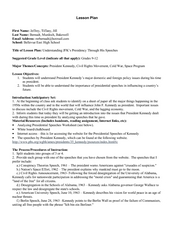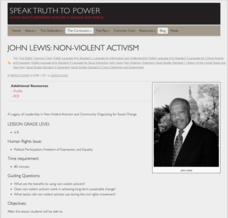Facing History and Ourselves
Defining Freedom
The Emancipation Proclamation freed slaves in the Confederate states. The Thirteenth Amendment banned slavery in the United States. However, neither document defined freedom. The second lesson in the Reconstruction Era series examines...
National Endowment for the Humanities
Who Were the Foremothers of the Women's Suffrage and Equality Movements?
Young scholars complete a unit of lessons on the women who contributed to the early Women's Rights Movement in the U.S. They conduct Internet research, examine images online, develop a list of women, complete a worksheet, and create a...
US House of Representatives
Objects in Time
Artifacts can be used to study people and events of the past. That's the takeaway from the fifth lesson in a unit study of African Americans who served in Congress. Groups select an artifact associated with a Black Congress Member from...
Curated OER
Learning From World War II and Connecting It to the Present
Compare and contrast World War II to the modern Iraq war with this instructional activity. After watching a film, learners use supporting evidence to support their point of view of the conflicts. Using the internet, they create a...
Curated OER
The Texas Revolution
Fourth graders examine the time period of the Texas Revolution. In groups, they research the contributions of Haden Edwards and Henry Raguet in the democratic process. Using primary sources, they place the events in the correct sequence....
Curated OER
Understanding JFK's Presidency through his Speeches
Students reflect and discuss the major events that happened in the United States in the 1950's and 1960's. In this U.S. History lesson, students read and analyze the famous speeches during this time frame, then complete a worksheet...
Curated OER
The Perfect President
Students advertise for the perfect president. In this presidential duties lesson plan, students determine the attributes that the ideal president should have and then write job descriptions for the role.
School Improvement in Maryland
Affirmative Action
Do the government's affirmative action policies promote equity in the United States? The Fourteenth Amendment to the US Constitution and affirmative action policies come under scrutiny in an activity that asks class members to...
Curated OER
Post-1865: Effects of the War
An engaging lesson focuses on the impact of the war and Lincoln's plan for Reconstruction had on the United States. Historians analyze primary documents, such as Constitutional Amendments and newspaper experts. They also participate in...
Encyclopedia Britannica
Political Issue Timeline
As part of a study of US Presidential elections, class members track the history of an issue in the 2020 campaign. They create a timeline to determine if there are any patterns, if ideas about the issue have evolved, or if in issue is no...
Encyclopedia Britannica
Election Topic Deep Dive
Researchers go beyond the surface of an election issue to craft an objective report on the history of the issue, factors surrounding the issue, and factors in a candidate' biography that may influence a candidate's position on the issue....
Museum of the American Revolution
The Ongoing Revolution
America: a nation that continues to change. Budding historians analyze primary sources to understand the key ideas of the American Revolution and how the country has changed over time. Scholars read text from the Declaration of...
Angel Island Immigration Station Foundation
The Chinese Exclusion Act
As part of a study of Angel Island Immigration Station, young historians examine the Chinese Exclusion Act of 1882, the first restriction on the United States immigration based on race and nationality. They complete a matrix identifying...
K20 LEARN
Reconstruction Treaties Of 1866: The Reconstruction In Indian Territory
The Reconstruction Treaties of 1866 and their impact on the Five Tribes in the United States Civil War are the focus of a lesson that asks young historians to consider how these treaties affected tribal sovereignty. Class members do a...
Museum of Tolerance
The Role of Citizens in a Participatory Democracy
Groups research participatory democracies and compare the role and rights of citizens in ancient history with those in recent U.S. history. Guided by a series of questions, individuals compose a persuasive essay in which they discuss the...
Breaking News English
More People to Stick to New Year's Resolutions
What makes a good New Year's resolution? Practice goal-setting and reading comprehension with a set of language arts activities. English learners work on cloze passages, synonym matches, interviewing exercises, and...
Curated OER
Volcanoes: Kindergarten Lesson Plans and Activities
In the pre-lab, kindergarteners mimic the movements of the eruption of a volcano and discover various volcanoes around the United States. Then, pupils sort different types of volcanic rocks in the lab before learning how volcanoes grow...
American Battlefield Trust
Southern Secession and Abraham Lincoln’s Presidential Election
President Abraham Lincoln: a true humanitarian or a savvy politician? The lesson plan focuses on Abraham Lincoln's presidency and the secession of the southern states. Academics interpret how Lincoln's presidential platform promoting...
Angel Island Immigration Station Foundation
How Do Pictures Tell the Story of Angel Island?
Young historians learn more about the history of Angel Island Immigration Station through their analysis of primary source images. Guided by a list of inferential questions, scholars learn how to make and record observations on a...
Curated OER
Understanding and Using Primary and Secondary Sources in History
Explore primary and secondary sources in this historical analysis lesson. Young researchers define the terms primary source and secondary source. They read a primary source document provided by the teacher and answer questions about...
Speak Truth to Power
John Lewis: Non-Violent Activism
After comparing and contrasting non-violent and violent social movements, your young historians will take a closer look at the work and influence of John Lewis on the civil rights movement. They will then choose a current social...
Macmillan Education
Webquest: Thanksgiving
Class members use the Internet to research the history of Thanksgiving in the United States and Canada, as well as the traditions surrounding the Thanksgiving-style celebrations of the Hebrews, the Chinese, and in Ancient Greece and Rome.
American Battlefield Trust
The Home Front
Women and children played key roles during the Civil War, even if their voices are often lost in history. By studying letters and personal testimony from them, budding historians get a glimpse into the day-to-day life of civilians during...
C-SPAN
Women's Contributions in the Civil War
Women's history is often hidden, but pupils discover the role women played in the Civil War using a series of video clips. After reviewing the interview with a scholar of women's history, class members fill out a chart and then research...

























